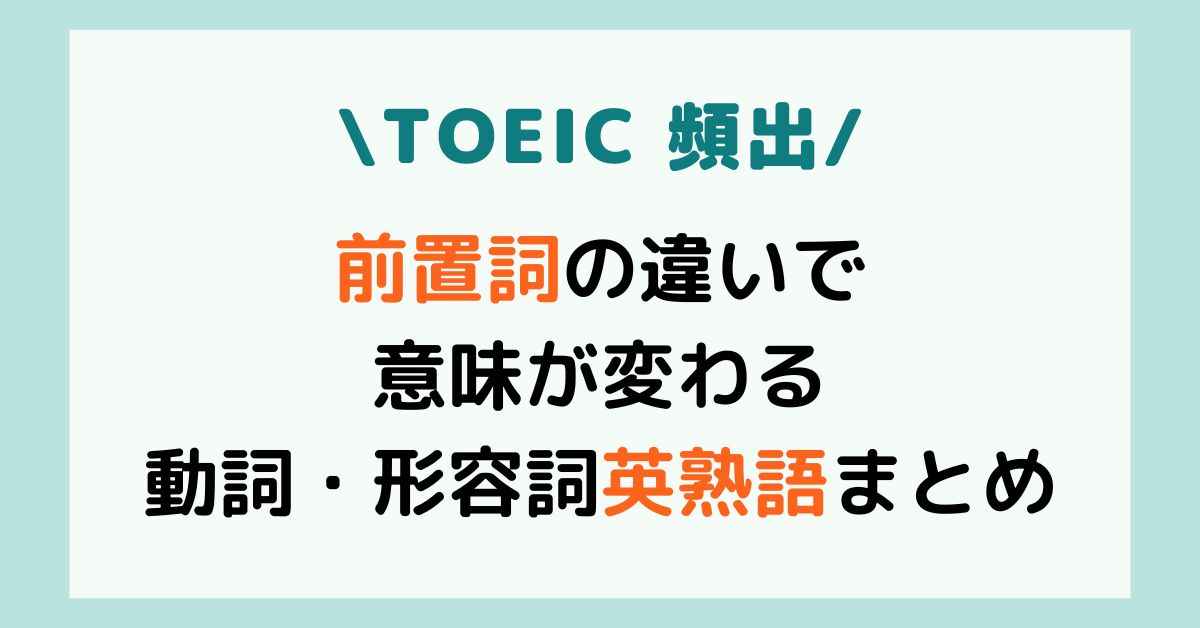最終更新日: 2022年09月13日

動詞/形容詞+前置詞で構成される熟語は、各単語の意味を覚えていても、前置詞によって全く違う意味になってしまうので、覚えるのに苦労する人も多いはず。このページでは、TOEIC でもよく出題される前置詞で意味が変わる動詞・形容詞を含む英熟語を練習問題や例文、イラストを使ってわかりやすくご紹介します!
目次
succeed in と succeed to の違い
問題:次の空欄に入る前置詞は何でしょう?
- She succeeded ___ passing her driving test.
- She succeeded ___ the position of CEO of the company.
答え:
- She succeeded in passing her driving test.
(彼女は運転免許試験の合格に成功した。) - She succeeded to the position of CEO of the company.
(彼女は会社のCEOの地位を継いだ。)

succeed in「〜に成功する」
意味:「~に成功する」
文法:in の後ろは動詞の ing 形か名詞を置きます。
例文
She suceeded in convincing her parents to go to study abroad.
(彼女は留学に行くことを両親に納得させるのに成功しました。)He succeeded in his new business.
(彼は新しいビジネスに成功しました。)
succeed to「〜を継ぐ」
意味:「~を継ぐ」
文法:to の後ろは名詞を置きます。
例文
She was only 20 years old when she succeeded to her father’s position.
(父親の跡を継いだ時、彼女はまだ20歳だった。)
result in と result from の違い
問題:次の空欄に入る前置詞は何でしょう?
- Climate change results ___ greenhouse gas emissions.
- Climate change results ___ the frequent occurance of natural disasters.
答え:
Climate change results from greenhouse gas emissions.
(気候変動は温室効果ガスの排出に起因する。)
Climate change results in the frequent occurance of natural disasters.
(気候変動は自然災害の頻発な発生という結果になる。)

result in「〜という結果になる」
意味:「~という結果になる、~につながる」
文法:in の後ろは名詞を置きます。
例文
His efforts resulted in a great success.
(彼の努力が大きな成功につながった。)
result from「〜に起因する」
意味:「~に起因する、~から生じる」
文法:from の後ろは名詞を置きます。
例文
His failure in the presentation resulted from a lack of preparation.
(プレゼンでの彼の失敗は準備不足に起因する。)
anxious to と anxious about の違い
問題:次の空欄に入る前置詞は何でしょう?
- I have not seen my daughter for two years, so I am anxious ___ see her.
- Because the questions were too difficult, I am anxious ___ the results of the exam.
答え:
- I have not seen my daughter for two years, so I am anxious to see her.
(娘に2年あっていないので、彼女に会いたくてたまりません。) - Because the questions were too difficult, I am anxious about the results of the exam.
(問題がとても難しかったので、試験の結果が心配です。)

anxious to「どうしても〜したい」
意味:「どうしても~したい、~することを切望している」
文法:to の後ろは動詞の原形を置きます。名詞を置きたい場合は anxious for にします。
例文
I am anxious to see you soon!
(あなたに会えるのをとても切望しています(=楽しみにしています))
anxious about「〜を心配している」
意味:「~を心配している」
文法:about の後ろは動詞の ing 形や名詞を置きます。
例文
I am very anxious about my father’s health condition.
(私の父の健康状態をとても心配しています。)
tired from と tired of の違い
問題:次の空欄に入る前置詞は何でしょう?
- I am tired ___ walking for three hours.
- I am tired ___ eating food at convenience stores every day.
答え:
- I am tired from walking for three hours.
(3時間も歩いてとても疲れています。) - I am tired of eating food at convenience stores every day.
(毎日コンビニの食事を食べるのは飽きました。)

tired from「〜で疲れている」
意味:「~で疲れている」
文法:from の後ろは動詞の ing 形や名詞を置きます。
例文
I was very tired from a three-hour meeting.
(3時間の会議でとても疲れました。)
tired of「〜にうんざりする」
意味:「~にうんざりする、飽きる」
文法:of の後ろは動詞の ing 形や名詞を置きます。
例文
I am tired of the news about political corruption.
(政治汚職のニュースにはうんざりします。)
いかがだったでしょうか?最初は少し覚えるのが大変かもしれませんが、紹介した熟語は TOEIC スコアアップには欠かせない頻出熟語ばかりなので、何度も見返してきちんと意味を覚えましょう!
ボイスチューブなら、エンタメや雑学、ニュースなどさまざまな動画を使って楽しく英語が学べます。今すぐアプリを無料でダウンロードして、楽しい英語学習ライフを始めてみませんか?
